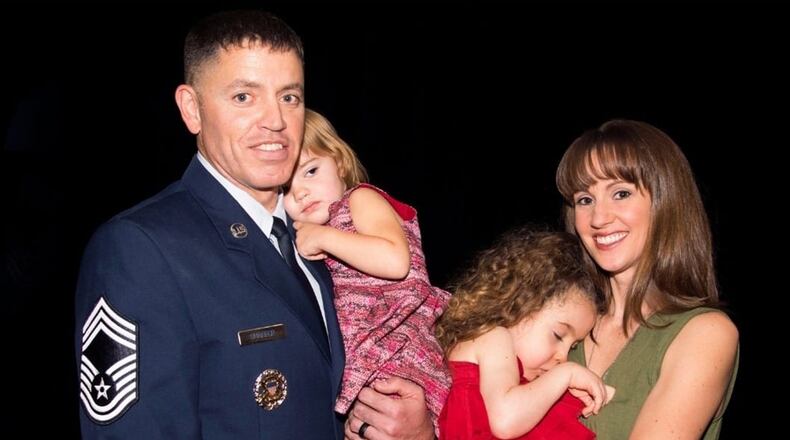Doctors explained to the Shaffers that Teagan had a congenital diaphragmatic hernia, with only a 50 percent survival rate. Teagan and Tawny were medevaced to Lubbock, Texas, while Jason was granted emergency leave and put on a plane within 24 hours.
The Shaffers begin a four-month stay at the hospital while Teagan has to go through two surgeries. Upon discharge, Teagan is released with oxygen support and a gastrostomy tube for supplemental feedings.
At 6 months old, Teagan got hospitalized for a month due to being herniated a second time.
On Dec. 20, 2015, she faced another three-month hospitalization after contracting the rhinovirus and enterovirus. Not only was Teagan sick, but she was intubated, required traditional and high-frequency ventilator support, nitric oxide, multiple chest tubes and needed to have a trach placed.
Although Teagan had multiple hospital stays and surgeries in her young life, she continued to fight.
“With all of this going on, she still came out the smiling, happy little girl everyone that met her had the joy of knowing. It was another stay and another win,” Tawny said.
Jason and Tawny believed the challenge of their daughter fighting CDH was getting better, until another life-changing hurdle presented itself.
On Dec. 20, 2017, Teagan contracted a respiratory-syncytial virus, and she suddenly couldn’t breathe. She became limp in her mother’s arms. After 20 long minutes, Teagan was injected with epinephrine and revived due to the heroics of the Shaffers’ paramedic neighbor and a rescue team that arrived.
Teagan was alive, but not without consequence.
“The result of Teagan’s brain being deprived of oxygen for an estimated 20 minutes was devastating,” Tawny said. “All Teagan’s hard-fought victories against CDH were gone, and she now had to start over at the beginning relearning everything, starting with how to breathe.”
Until then, the Shaffers believed they were finally starting to conquer all the adversity thrown at them.
“We thought we could get over and fix all of the other things,” Jason said. “The brain injury has been really hard because it has changed our lives and changed our family.”
Once Teagan was declared stable enough, she was released from the hospital after four months to begin her path to recovery.
Teagan was not the only one who had to recover. After years of watching her go through multiple hospitalizations and surgeries, Jason and Tawny had to find a way to continue fighting adversity for their two other children and one another.
“Until you are in a situation, you do not fully know how mentally exhausting it is,” Tawny said. “It was tough to spend all day in the hospital watching Teagan fight for her life while hooked up to different machines, as well as doctors coming in and out telling us that things have been getting better or worse. Then we would still have to go home and be present for our other children and each other.”
Along with mental exhaustion, there was also a feeling of failure.
“The hardest part for me and Tawny is that we do not feel accomplished and that we let Teagan down,” Jason said. “It may not be our fault, but we feel like it is because we have not overcome it.”
The difficulties the Shaffers faced were never easy, but they’re never easy alone. A solid support system of family, friends and the Air Force helped them continue fighting throughout all the hardships.
“We have gotten closer to our friends, our family and the military because we had to rely on them,” Tawny said. “When we were in the hospital, we would need people to pick up our other kids or watch them all day. Because of that, our circle has gotten stronger.”
Once the Shaffers realized the help the Air Force provided through research and discussions with other military members, new opportunities and programs started to unfold.
“The support we received from the Air Force helped in many ways,” Jason said. “Sometimes people go through scenarios and do not realize the support system that the Air Force provides. I wish I could tell everyone exactly what the Air Force will do for you because of what you mean to the mission.”
One of the Air Force’s most important resources is Airmen, the command chief added.
Without Airmen, the mission cannot be completed. Each Airman has the power to discover all available resources, or even other outlets to counteract that feeling of failure.
“Nobody is perfect and even Airmen can feel the pressure of failure,” Jason said. “That is why it is important to find outlets to clear the mind and feel accomplished.”
The Shaffers discovered that one of their outlets was social media. Not only did they find support through many, including people they never met before, but they also found resources and others going through the same challenges.
“Social media has been the really big thing that has helped me,” Tawny said. “Teagan has a lot of different conditions, so I follow different groups to learn as much as I can. It is refreshing to see people in social media groups going through the same thing while others in that group motivate and provide resources that may help.”
Any trial that arrives and concludes with failure can lead to the learning of new information, the couple says. This new information can lead to your next accomplishment.
“Nobody is going to hand you the pamphlet for these things because each person’s situation is unique. You have to search and you have to ask to discover the things that are available to you,” Tawny said.
Everybody falls short at one point or another, the Shaffers say. They urge people facing troubles to seek out available resources for themselves and others who might be.
They took the same path, and they know that resilience journey starts within.
About the Author


